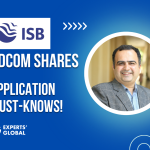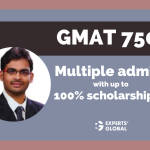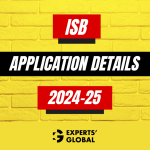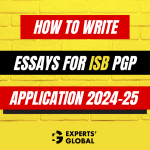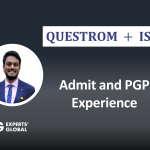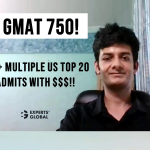Verbatim
Experts’ Global: Hi Arpit, thank you for agreeing to this interview! Could you share your journey with our readers?
Arpit: I have an undergrad background in civil engineering, and worked in infrastructure consulting as well as dabbled in the start-up world for a bit. It was in this entrepreneurial phase of my life that the need for an MBA really became clear to me. With the help of ISB admissions consultants Experts’ Global, I got my PGP admit and specialized my degree in Finance. Post-PGP, I joined the investment vertical of Shell.
Experts’ Global: In your opinion, what actions of yours made the difference in your success?
Arpit: I would say a lot of things contributed to my success. In terms of the GMAT, taking GMAT mocks at a regular pace kept my confidence and preparation at a high pitch. Having clear guidance during the application journey thereafter helped a lot, and support from my peers and family kept me motivated when the going got tough.
Experts’ Global: With the benefit of hindsight, what mistakes did you make in the process?
Arpit: I think I should have pursued an MBA a bit earlier in my life. Regarding my GMAT prep, I should have started out by taking a free GMAT practice test before my studies began in order to optimize my weakness better. The essays required me to introspect and articulate the best parts of myself effectively, and I feel like starting earlier with drafting them would have allowed me to write better. More personally, I would advise that as soon as applicants begin to feel stagnation in their career growth, they should begin planning for their own MBA.
Experts’ Global: What resources did you use for your GMAT prep and what advice do you have for fellow applicants about the same?
Arpit: The GMAT is quite different from other exams, in that it is a test of your mental ability. Adequate and consistent practice can help you improve on the same and further your score. Treat the official material from the GMAT website as your bible. Apart from that, pick a good GMAT online course if you wish to refer to other resources and enhance your practice. As long as you understand what your weak conceptual areas are and practice to shore them up, you should do well on the GMAT.
Experts’ Global: How was your experience with managing the application timelines?
Arpit: For the application timeline, just try and have two to three times the time in hand than you think it will take you to complete all your application materials. Assuming you want to pursue an MBA after three years of work experience, begin your research and GMAT prep a year in advance. You may also not be able to secure admission to your desired school on your first attempt, which makes starting early even more important for the subsequent attempt. Start planning your timelines based on the estimated or actual deadlines for your targeted schools.
Experts’ Global: Would you like to share your interview experience with the business school?
Arpit: The MBA interviews, in my experience, are quite candid. The objective of the interview itself is to see how rational, confident, and inspired a candidate is in their thought process. Candidates are also tested on their fit for a school’s culture.
For the MBA interview, try and draw parallels with your daily work life. Even professionally, you deal with a lot of people and have conversations with them on a regular basis, and the MBA interview is a conversation just like that. As long as your MBA interview prep basics are in place and you are able to make a convincing and authentic case about how your ambitions fit into the school’s ethos, you will do fine.
Experts’ Global: How has your PGP experience been?
Arpit: My time at ISB has been one of the best periods of my life. The PGP teaches you to think in a structured fashion, and so solve problems. The peer interactions and conversations with faculty at ISB have really broadened my perspective. I have learned a lot about Finance from my classmates and even had the chance to visit Harvard through an exchange program. Truly, I was able to expand my cultural viewpoint as well.
Experts’ Global: How was your post-PGP job search and do you have any advice for applicants about the same?
Arpit: Think about how the MBA application process is so grueling, and how it prepares one for the rigorous MBA experience. One of the most vital parts of any MBA is the placement process. For the same, at ISB, we had to work on refining our resumes, network with different recruiters and professionals in our targeted domain or firm, and learn to communicate the lessons the PGP had taught us with clarity.
I wished to join the Finance sector but kept consulting and general management profiles as my fallback. ISB, just like any other business school, had considerable employment support for us to draw on in the form of workshops. Overall, I would say that even beyond the boost provided by placements, an MBA gives you a lifelong brand that will open professional doors for you in the years to come.
Experts’ Global: Can you tell us about your journey post-PGP, and how the pre-application process has influenced you?
Arpit: The pre-application process helps you get a taste of the exact nature of the actual MBA. It also empowers one to reflect on one’s life and ambitions. This clarity helps you come up with a more authentic profile. Even if your goals change during the MBA, your introspection allows you to get a sense of the many directions you may wish to explore. My MBA experience allowed me to move to the investment sector, and the lessons on outreach and research that I learned during the pre-application process prove useful to me today.
Experts’ Global: What is your final advice to applicants out there?
Arpit: Above all else, be curious. Have a mentor who has gone through the MBA journey at your side to advise you. Start your application work as soon as you can, and for the application work, try and have an MBA admissions consultant at your side.
In the MBA, realize that the ethos is not about competition but about collaboration. Share your knowledge with your peers, learn from their insights, and build a network that will last you a lifetime. Overall, even if you stumble, try to hold on to the certainty that you will learn from your missteps and overcome them!
Experts’ Global: Thank you for sharing your insights with all the applicants out there, Arpit!
Arpit: I hope my words prove useful to someone!

